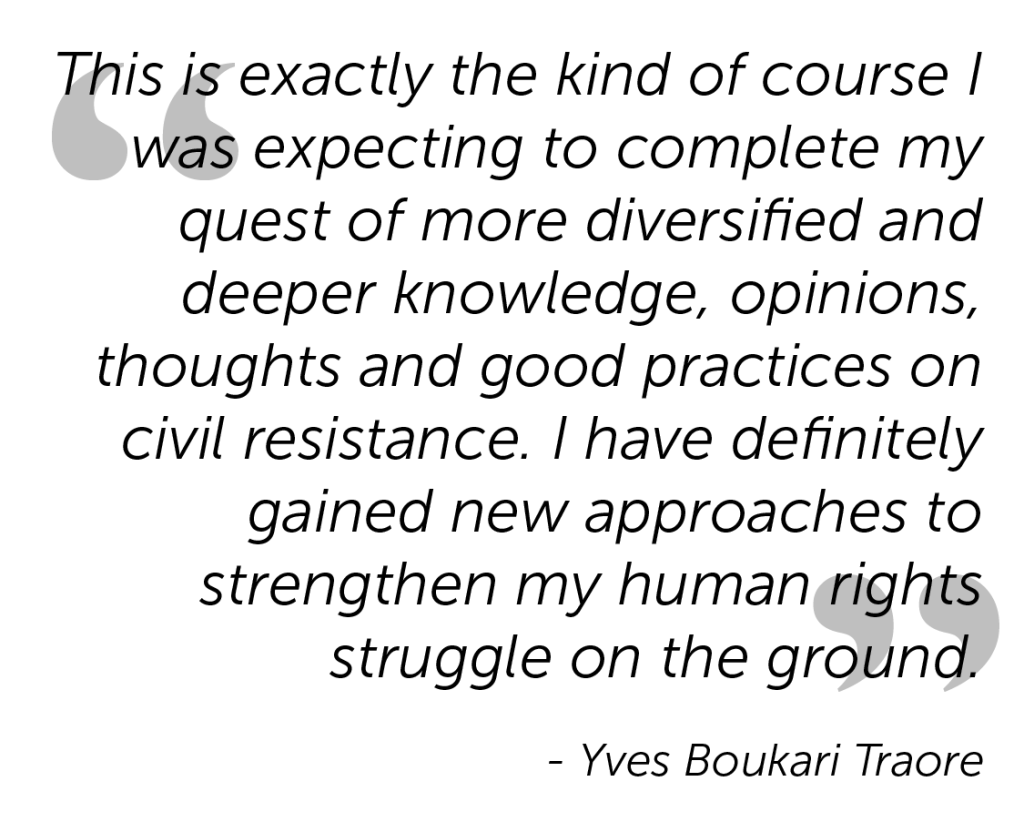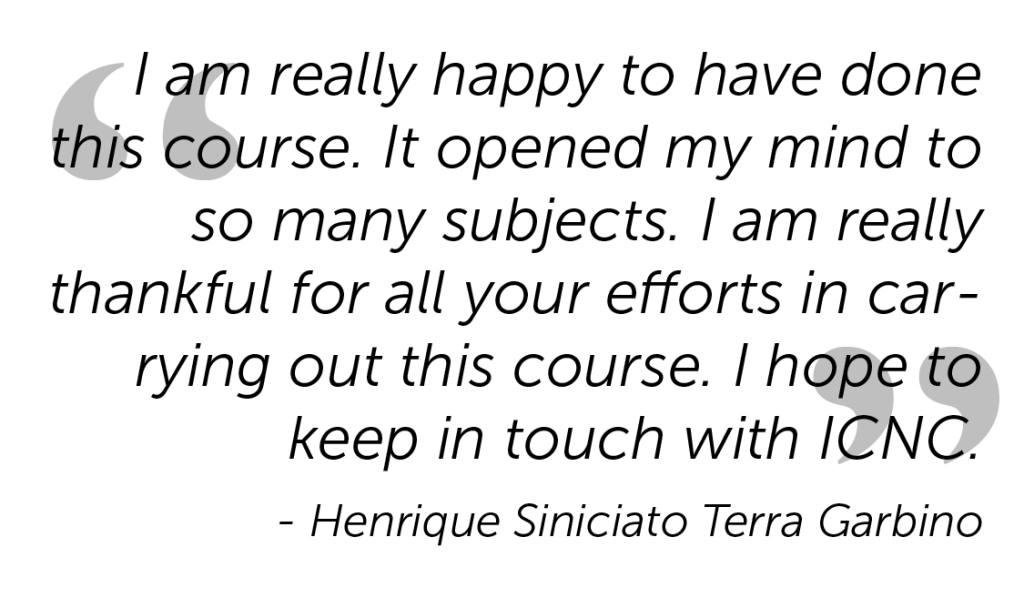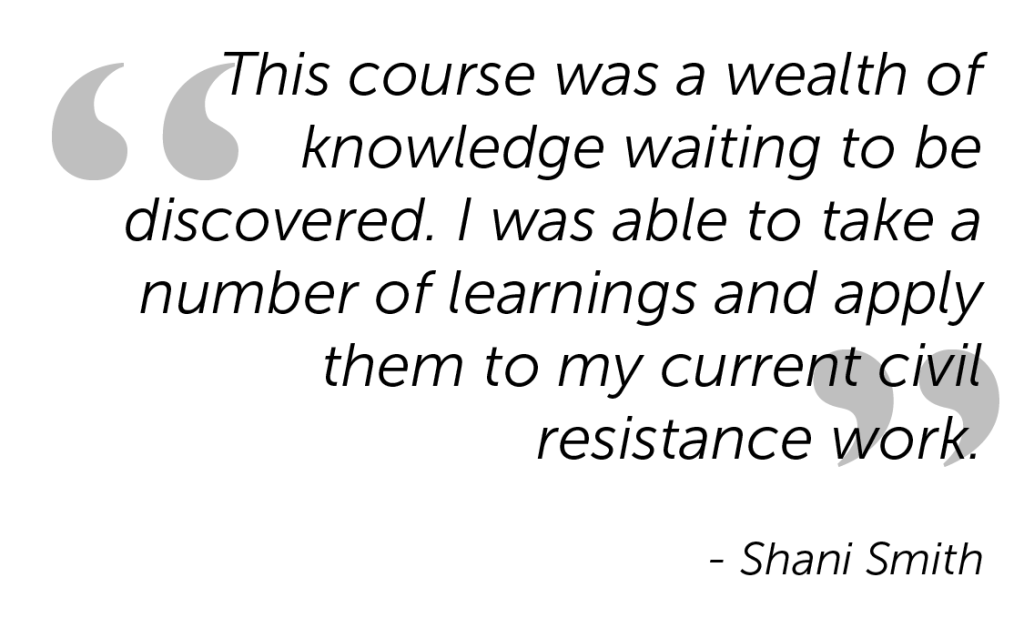ICNC offered a moderated online course on civil resistance in partnership with the International Institute for Peace at Rutgers University Graduate School, which took place from October 9 to November 17, 2015.
Use the following links to navigate:
- Applications, admission and course participants
- Course moderation
- Course content
- Final evaluation results
- Selected testimonials
Applications, admission and course participants
ICNC received 142 applications and accepted 62 participants. The selected participants came from 26 countries, and included activists and organizers, international development and human rights professionals, journalists, educators, and students.
Six ICNC staff members moderated various discussion forums in the online course, adding significant value to the overall educational experience. The course moderators included: Dr. Maciej Bartkowski, Shaazka Beyerle, Althea Middleton-Detzner, Amber French, Katherine Hughes-Fraitekh. The course administrators were David Reinbold and Cathy Smith.
Check what participants thought about the course moderation.
In addition to the interventions in the discussion forums, course moderators provided weekly summaries from the forum discussions in a particular module, highlighting key points made, debates taking place and core information that was shared.
The online course consisted of an introduction and six thematic modules. Each thematic module was released at the beginning of the week and the participants and moderators would engage in different forums of the module throughout the week. A detailed course outline is provided below.
Check out what participants thought about the course content.
Module 1. Foundation of Civil Resistance
What Is Civil Resistance?
People and Power
Effectiveness of Civil Resistance
Module 2. Emergence of Civil Resistance, Conditions and Skills
Emergence of Civil Resistance Movements
Conditions and their Impact
Skills Drive Civil Resistance
Module 3. Strategies and Tactics of Civil Resistance
Nashville Lunch Counter Campaign (U.S. Civil Rights Movement)
Strategic Planning and Tactical Choices
Cultural Resistance Tactics
Tactical Innovation
Conflict Analysis Tools
Module 4. Repression and Backfire, Defections, Violent Flank
Repression and Backfire
Defections
Violent Flanks
Module 5. Variety of Topics on Civil Resistance
People Power versus Corruption and Impunity
Civil Resistance in War-Torn Environments
Women and Nonviolent Resistance
Communication Strategies for Civil Resistance
Module 6. Variety of Topics of Civil Resistance
External Actors and Civil Resistance
Civil Resistance and New Technologies
Democratization and Civil Resistance
Civil Resistance and Corporate Governance
Included below are graphed responses to selected questions from the final course evaluation.
- Course content
- Knowledge gains
- Learning from other participants
- Quality of course moderation
- Meeting participants’ expectations
- Recommending the course
- Course relevance to work/study/activism
1. Course content was organized and planned
2. Course modules and content were timed and sequenced well
3. Course content was comprehensive, balanced and topics well selected
4. I now have more knowledge about civil resistance and its various topics than I had before taking the course
Learning from other participants
5. I learned about civil resistance from course participants
6. I learned about civil resistance from course moderators
7. Course moderators offered useful comments
8. I found module summaries shared by moderators relevant and helpful
Meeting participants’ expectations
9. Course met or exceeded my expectations
10. I would recommend this course to other people
Course relevance to future study/work/activism
11. I expect the knowledge from the course to be relevant in my future study/work
12. Where do you plan to apply the knowledge from this course?
“This course was a wealth of knowledge waiting to be discovered. I was able to take a number of learnings and apply them to my current civil resistance work.”
– Shani Smith, ICNC online course participant, 2015
“This is a great, rigorous course on civil resistance from start to finish, covering more ground than you imagine is possible!”
– Rivera Sun, ICNC online course participant, 2015
“I am really happy to have done this course. It opened my mind to so many subjects. Since I am in the military, [nonviolent conflict] may sound counterintuitive (even though by our own doctrine it should not), but now I will always think of the nonviolent option as probably the most effective one. I am really thankful for all your efforts in carrying out this course. I hope to keep in touch with ICNC.”
– Henrique Siniciato Terra Garbino, ICNC online course participant, 2015
“This is exactly the kind of course I was expecting to complete my quest of more diversified and deeper knowledge, opinions, thoughts and good practices ( from the other participants) on civil resistance. I have definitely gained new approaches to strengthen my human rights activist daily struggle on the ground.”
– Yves Boukari Traore, ICNC online course participant, 2015
“Thank all our Moderators and facilitators of their courage, professionalism and experience they demonstrated in making this a true learning process and experience in my life long career in Global Peace education. Thank you.”
– Kamara Ibrahim, ICNC online course participant, 2015












